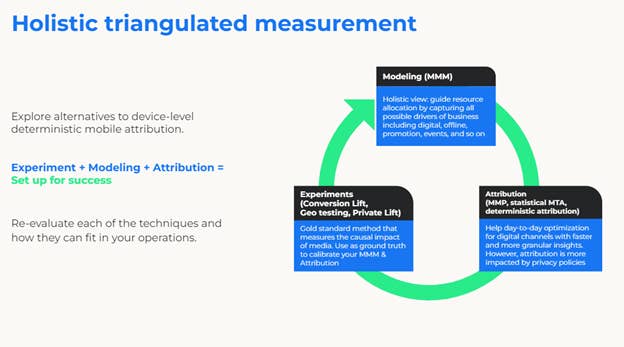Mobile games publishers need a transformation before it’s too late
Why an overreliance on attribution has impeded progress in gaming
By Kate Minogue, Head of Marketing Science, Facebook Gaming, EMEA at Meta
Over two years ago, in a bid to focus on consumer privacy, Apple announced their plans to introduce App Tracking Transparency (ATT). Its arrival, among other changes, would give cookies and id-based attribution a shelf life --changing the way mobile advertising ids are used and, as a result, causing mammoth disruption to usual marketing practices.
Long-rumored, when the announcement was officially made, advertising and adjacent engineering teams scrambled to unpack and understand the SKAdnetwork and Conversion Schema components of ATT. They invested into being “ready” for their arrival, but for a lot of companies, this is where they stopped.

We can rationalize why more exorbitant action didn’t take place before the announcement or the rollout of iOS14 itself; there was likely a reasonable business trade-off versus the investment required for longer-term resilience. However, what the industry is experiencing is a data revolution. We’ve entered a privacy-first reality that has significant implications for the technologies and infrastructure on which gaming companies were built. These changes require a real assessment of core competencies and operating models if companies are to continue to compete and be profitable. The actions taken to date have been localized to marketing teams and have relied on existing expertise to solve new problems. As such -- with the response being disproportionate to the magnitude of disruption -- the necessary move away from attribution has not happened. It hasn’t been considered as a company-wide imperative, despite needing to be.
As of yet, the industry continues to stall the full organizational transformation needed to increase the accuracy of investment decisions. It’s been stuck in a cycle of maintaining Android campaigns, retaining a focus on attributed results (despite the gaps) and laboring to get performance back to pre-ATT levels. Many companies have yet to embed new measurement approaches into the core of their business operations and to meet a changed landscape with open arms, but it’s now time to do just that.
"The necessary move away from attribution has not happened"
Kotter’s 8-step process for leading change
Looking at business thought-leader John Kotter’s 8-Step Change Model, we can analyze and unearth key actions gaming companies can take to thrive in a privacy-first landscape.
1. Increase urgency
The first, and most vital, step is also the most lacking today. The continued trust in attribution as a single source-of-truth has prevented companies from acting with the required urgency to initiate more significant change. Whether Google’s privacy sandbox arrives in 2023 or 2024, it’s coming. Further, (albeit not yet enforced), fingerprinting, a widely touted industry solution, is in violation of Apple’s terms. Even if attribution gaps are not equal across all channels, they do exist. This means that investment decisions being made using legacy approaches are not the most accurate, and money is being lost.

Human nature is such that people will not change until the alternative has been taken away or the pain of not changing is worse than the effort to change. The urgency needs to be made clear at an industry level but leaders also need to land it with their teams.
2. Build the guiding team/coalition
Of course, a move from attribution-based decision making to multiple sources of truth, will mean significant operational changes for marketing teams; the rhythm of business, budget distribution, the required skills and more. To put steps in place for change, a leadership team for this effort needs all stakeholders to unite and have a willingness to disrupt how things are done. Analytics resources may need to be redeployed (or purposefully hired) to support new marketing use-cases and central marketing analytics teams may be required to own the new stack. Additionally, finance teams may need to familiarize themselves with why data sources and KPIs have changed. The right functions, but also the right attitudes, are key for this leadership team. A fixation with ‘the way things were’ is not going to serve the next phase of evolution.
3. Get the strategic vision right
Teams must know where they’re going and why. This involves outlining how things will be different and what the end goal looks like. In this case, the end goal is accurate and resilient measurement of marketing impact. The best-in-class version of this is a triangulation (or as some call it “Unified Marketing Measurement”) between:
- Attribution—for day-to-day optimization.
- Marketing Mix Modeling (MMM)—for strategic budget decisions across channels.
- Experimentation—to ensure that all decisions are grounded in true incrementality and a test-and-learn mindset.

Each company has a different starting point in this journey and different principles that might serve as barriers to where they’re going. Operationally, certain parts may be more difficult than others but defining the direction is key.
4. Communicate
Once a clear vision is defined, teams need to have hard conversations to allay any concerns. This is an opportunity to ensure a cohesive understanding of what teams must do differently and how they can deliver the greatest outcome. Individuals must know of the roles they now need to fulfill, whether it be an entirely new one or an extension of their current one. Communication is always one of the most important stages and moving forward with the right set of influential advocates will make the journey smoother.
5. Remove obstacles to empower action
Gaming leadership may be holding back; we hear from C-level that they know what is needed but mindsets and operations haven’t caught up. It’s vital to diagnose why: What is the hard part for each individual? What decisions aren’t being made or what project isn’t being prioritized? For MMM, in particular, we see projects fail at the point of being operationalized. The initial model build feels more like an academic exercise that delivers insights but doesn’t progress from there. In parallel to the technical work, other teams should plan how this can be used and what the processes will look like. Broadly, this is both a marketing and performance management challenge because if teams are still guided by metrics and targets that fit with attribution, then they’re not motivated to explore alternatives. If short-term ROI remains the only priority, then innovation will be quashed. To remove these obstacles, senior executives need to consider options such as incentive audits, new layers of decision-making protocol or new team structures to make space for the future.
6. Find short term wins
Gaming companies have become accustomed to instant results and this frame of mind might be a barrier to embarking on the long path for change. That being said, if there are quick wins that can be found along the way, then this can motivate teams to continue with the change. For example, one-off geo experiments (such as Meta’s GeoLift or Google’s GeoX) can shine a light on the inaccuracy of present day attribution and spur on the next stages of closing those gaps.
"Gaming companies have become accustomed to instant results and this frame of mind might be a barrier to embarking on the long path for change"
7. Keep momentum going
Each new change can build on the last; dismantling the end-goal into component parts makes everything more digestible. However, it’s important to maintain motivation and momentum throughout. There’s a risk that success will be declared prematurely, whether that looks like the current acceptance we see of attribution’s flaws, or a one-off analysis which highlights gaps but never infiltrates decision-making processes. Marketing measurement has never been perfect and other industries wrestled with this before gaming had to. The common goal is to be “less wrong” and we can keep teams on track by recognizing their milestones along the way rather than legacy definitions of success.
8. Anchor the changes in corporate culture to make it stick
Short-term ROI continues to be the driving force and as a result, user-level and real-time granularity are still worshiped. Slowing down and building for the long-term requires a cultural shift. The business’ rhythm may need to change and performance targets may not be what they once were. The approach to marketing and overall competitive advantage may need to be revisited. And further, the teams and leaders that were central to performance until today, may look entirely different for success in the future.
Conclusion
Whether data privacy limitations had appeared now or down the line, the gaming industry was approaching a stage of maturity where a shift towards assessing the incremental value of each investment was needed. In the context of what has happened, this approach is even more vital and can be driven from a leadership objective, straight down to a marketing measurement KPI which is more resilient to signal loss than attribution.
The later steps in the 8-step process won’t happen overnight and to start on the right track, we must embed realistic expectations on results in the near time. The journey starts with urgency -- the understanding that change needs to happen now and the right team to make it happen must be created (if it doesn’t already exist). Apple’s ATT update has brought us to an inflection point that comes with compromises. But we need to trust that the skills, innovation and agility which exist in this industry, can be redeployed to build an even stronger future. Embracing that transformation begins today.
For more information on how Facebook Gaming can help you to achieve your business goals, please visit our website here.
